How AI Applications in Agriculture Improve Crop Yield & Efficiency
Table Of Content
Published Date :
28 Aug 2025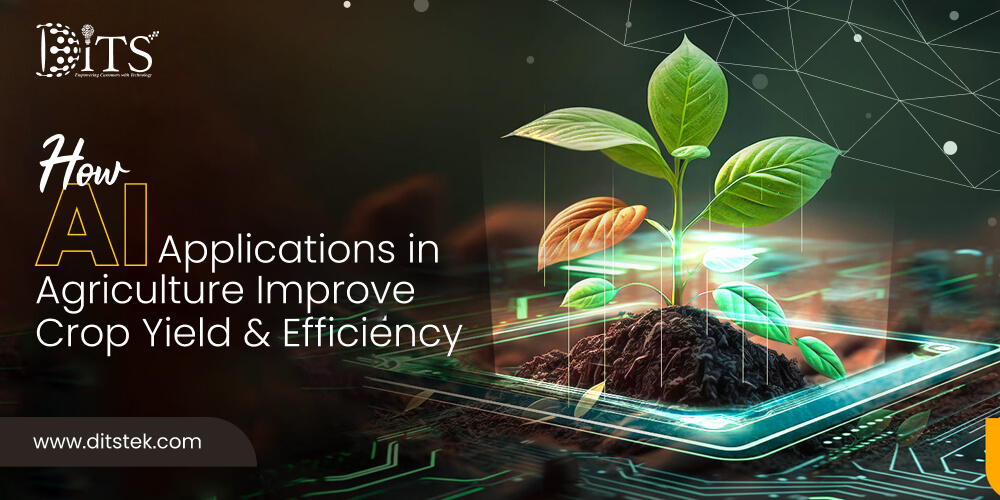
Agriculture has always been the backbone of human survival, but with rising food demand, shrinking arable land, and unpredictable climate conditions, the industry faces immense challenges. To meet these demands, farmers and agriculture companies are turning to modern technologies that make farming smarter, faster, and more productive. AI applications in agriculture are helping businesses improve crop yields while optimizing resources like water, fertilizers, and labor.
From monitoring soil health to predicting weather patterns and automating crop management, artificial intelligence is reshaping traditional farming into a data-driven, highly efficient process. For agriculture businesses, integrating AI doesn’t just mean higher productivity; it also ensures long-term sustainability and profitability. This blog shares how AI applications in agriculture help improve crop yield and efficiency.
Want Higher Yields with Lower Costs?
AI farming solutions redefine efficiency—optimizing water, soil, and labor. Complete the form to explore actionable insights designed for today’s agriculture challenges and tomorrow’s opportunities.
Current Challenges in Agriculture
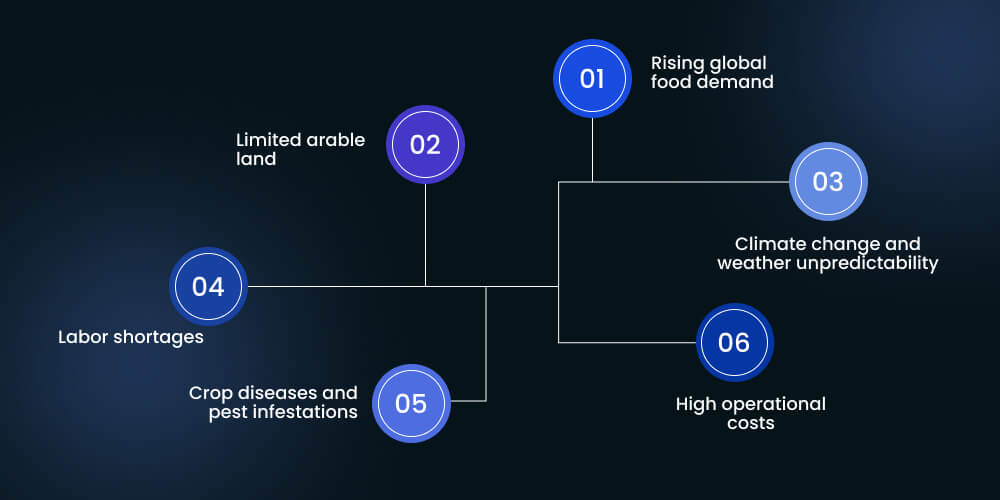
The agricultural sector is undergoing rapid transformation, but several challenges continue to hinder growth and efficiency. Business owners and farm operators often struggle with the balance between increasing production and managing costs, while also adapting to unpredictable conditions. Some of the key challenges include:
- Rising global food demand: With the world’s population expected to surpass 9 billion by 2050, the demand for food is climbing faster than traditional farming methods can support.
- Limited arable land: Expanding farmland is no longer a viable solution, making efficient use of available land critical.
- Climate change and weather unpredictability: Extreme heat, floods, and shifting rainfall patterns create uncertainty for crop production.
- Labor shortages: Many agricultural regions face reduced workforce availability, increasing reliance on automation and advanced tools.
- Crop diseases and pest infestations: These remain major threats to yield, often spreading quickly and causing significant losses.
- High operational costs: Rising expenses for water, fertilizers, pesticides, and machinery maintenance cut into profit margins.
These challenges highlight the urgent need for innovative solutions that can help agriculture businesses become more resilient, sustainable, and profitable. This is where advanced technologies like artificial intelligence play a crucial role in addressing these challenges in agriculture.
Role of AI in Agriculture
The Role of AI in Agriculture is becoming increasingly important as farmers and agribusinesses look for smarter ways to manage resources and improve efficiency. Unlike traditional methods that rely heavily on manual observation and experience, AI uses data-driven insights to guide decision-making at every stage of farming, from planting to harvesting.
Artificial intelligence in agriculture helps in analyzing soil conditions, monitoring crop health, and even predicting the best time for harvesting. By combining real-time data with predictive models, AI enables farmers to make accurate and timely decisions that reduce waste, lower costs, and maximize yields.
For business owners, this means more than just better harvests. AI helps farmers and agricultural businesses turn challenges into opportunities. Whether it’s automating irrigation, detecting early signs of disease, or forecasting market demand, AI is creating a more sustainable and profitable path for the agriculture industry.
Is Your Agribusiness Future-Ready?
From smart irrigation to predictive analytics, AI is reshaping farms worldwide. Fill out the form to learn how your agribusiness can adapt, thrive, and stay competitive.
Key AI Applications in Agriculture: Improving Crop Yield & Efficiency
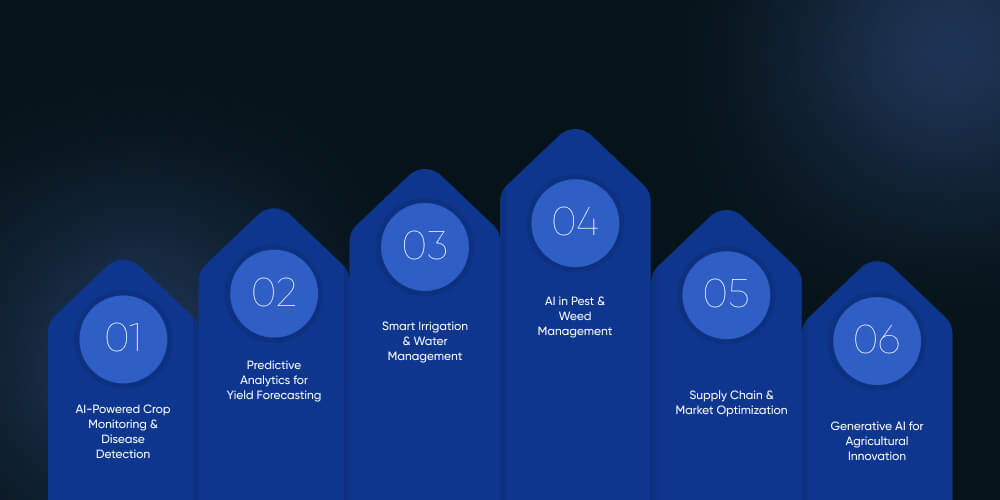
Artificial intelligence is reshaping how crops are grown, monitored, and harvested. The following AI applications in agriculture show how modern farms and agribusinesses are using technology to maximize output and minimize waste.
AI-Powered Crop Monitoring & Disease Detection
One of the most practical applications of AI in agriculture is real-time crop monitoring. Using drones, sensors, and computer vision, AI can detect early signs of disease, nutrient deficiencies, or pest infestations. Farmers can act quickly to protect crops, reduce losses, and limit the use of unnecessary chemicals.
Predictive Analytics for Yield Forecasting
AI farming tools analyze soil health, weather conditions, and crop growth patterns to provide accurate yield forecasts. These insights help farmers plan ahead, allocate resources wisely, and reduce risks. Businesses can also use this information for better supply chain and market planning.
Smart Irrigation & Water Management
Water is one of the most critical resources in farming. AI-driven irrigation systems use IoT sensors and predictive analytics to determine the exact amount of water crops need. This ensures healthier plants, reduced water wastage, and improved sustainability.
AI in Pest & Weed Management
AI-powered robots and drones can identify weeds and pests with high accuracy. Instead of spraying entire fields, farmers can target only the affected areas, reducing costs and limiting the environmental impact of chemicals.
Supply Chain & Market Optimization
Beyond the farm, AI helps in forecasting demand, optimizing pricing, and reducing post-harvest losses. By streamlining the supply chain, businesses can increase profitability and deliver fresher produce to markets.
Generative AI for Agricultural Innovation
Among the most promising developments are generative AI applications in agriculture, which can simulate crop growth scenarios, recommend customized farming strategies, and even design new solutions for sustainable agriculture. For businesses asking, “What are some innovative AI applications in agriculture?” generative models are opening new doors to smarter, more adaptable farming systems.
Business Benefits for Agriculture Companies
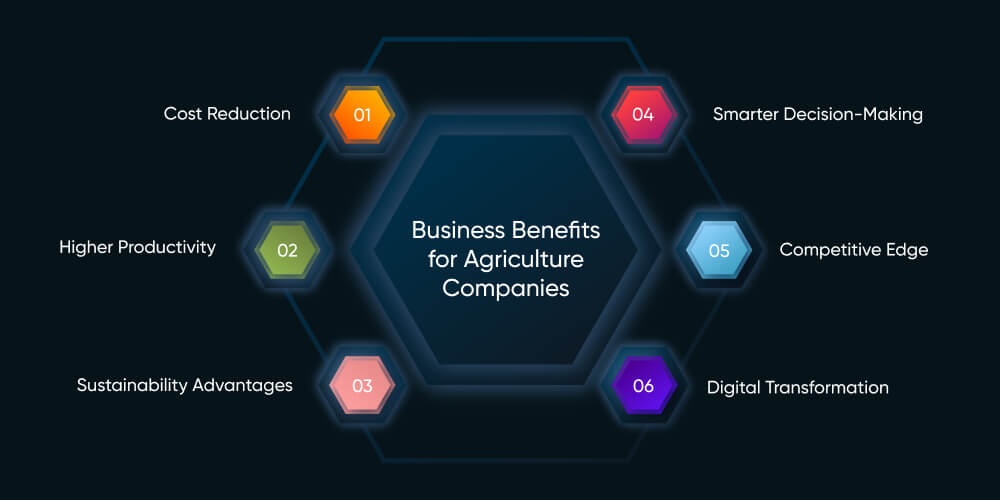
For agriculture businesses, adopting AI is not just about using technology; it's about gaining long-term resilience and higher profitability. Here are the key benefits:
Cost Reduction
AI farming solutions optimize the use of water, fertilizers, pesticides, and labor. This reduces unnecessary expenses, lowers operational costs, and ensures resources are applied efficiently, directly improving profit margins while maintaining crop quality.
Higher Productivity
AI applications in agriculture deliver accurate insights on soil, crop health, and weather. Farmers can make proactive decisions, reduce risks, and achieve consistently higher yields. Increased productivity also supports expansion into larger markets and strengthens food supply chains.
Sustainability Advantages
Precision irrigation, AI-driven pest detection, and optimized nutrient management cut down environmental damage. By reducing chemical usage and conserving water, businesses contribute to sustainability while still meeting rising food demands. Sustainable practices also enhance brand reputation and appeal to eco-conscious consumers.
Smarter Decision-Making
Real-time analytics and predictive models enable businesses to forecast challenges and respond promptly. Whether anticipating pest outbreaks, changing weather, or market demands, AI ensures leaders make informed choices that protect crops and increase profitability. This turns uncertainty into opportunity.
Competitive Edge
Companies that integrate AI farming tools gain operational efficiency, stronger yields, and faster market readiness. This allows them to outperform competitors who still relying on traditional farming methods. A competitive advantage in cost, quality, and delivery helps attract partners and long-term customers.
Digital Transformation
By partnering with an AI software development expert, agriculture businesses can develop tailored solutions suited to their unique challenges. From smart irrigation systems to AI-powered forecasting tools, customisation ensures maximum efficiency and seamless adoption, setting the foundation for future innovation and growth.
Seeking Sustainable Farming Practices with AI?
Precision irrigation and optimized resource use ensure eco-friendly farming. Fill out the form to discover AI strategies that balance productivity with sustainability in agriculture.
Real-World Examples of AI in Agriculture
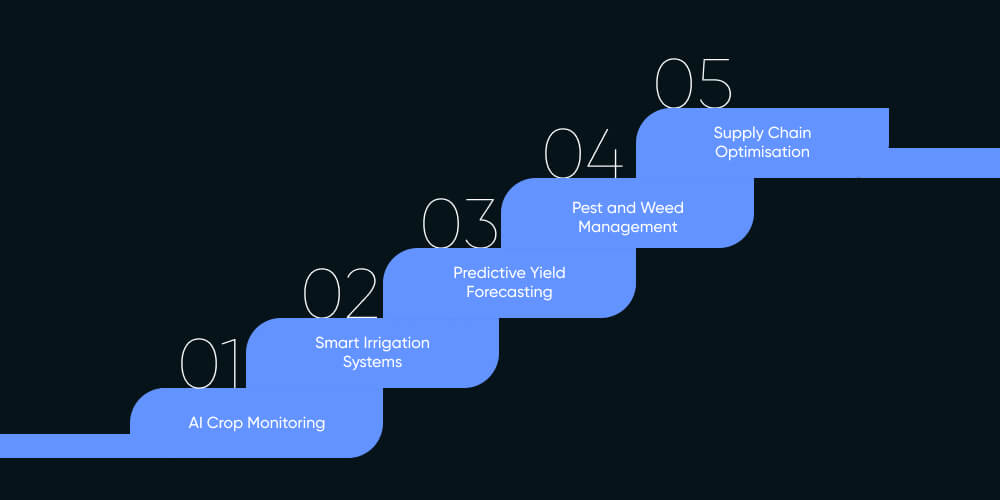
The best way to understand the impact of AI in farming is by looking at how businesses are already applying it in real scenarios. Here are some practical applications of AI in agriculture with examples that highlight measurable improvements:
AI Crop Monitoring
A vineyard in California uses AI-powered drones with computer vision to detect early signs of disease in grapevines. This enables faster treatment, reduces losses, and ensures higher-quality yields without excessive chemical usage.
Smart Irrigation Systems
Farms in India have adopted AI-driven irrigation platforms that use soil moisture sensors and weather predictions. The result is up to 30% water savings and healthier crops, making farming more sustainable.
Predictive Yield Forecasting
Grain producers in Australia employ AI farming models to predict crop yield months before harvest. This helps with logistics, pricing strategies, and meeting international market demand without unexpected shortages.
Pest and Weed Management
A soybean farm in Brazil implemented AI-enabled robots that identify weeds and spray herbicides only where needed. This reduced chemical costs by nearly 40% while protecting soil quality.
Supply Chain Optimisation
European fresh-produce exporters use AI tools to predict demand, optimise inventory, and reduce post-harvest waste. Faster distribution ensures better profits and fresher products reaching supermarkets.
From disease detection to crop irrigation, weather forecasting, and crop distribution, artificial intelligence in agriculture is enabling businesses to scale operations with higher efficiency and lower costs.
How to Integrate AI Into Your Agricultural Business
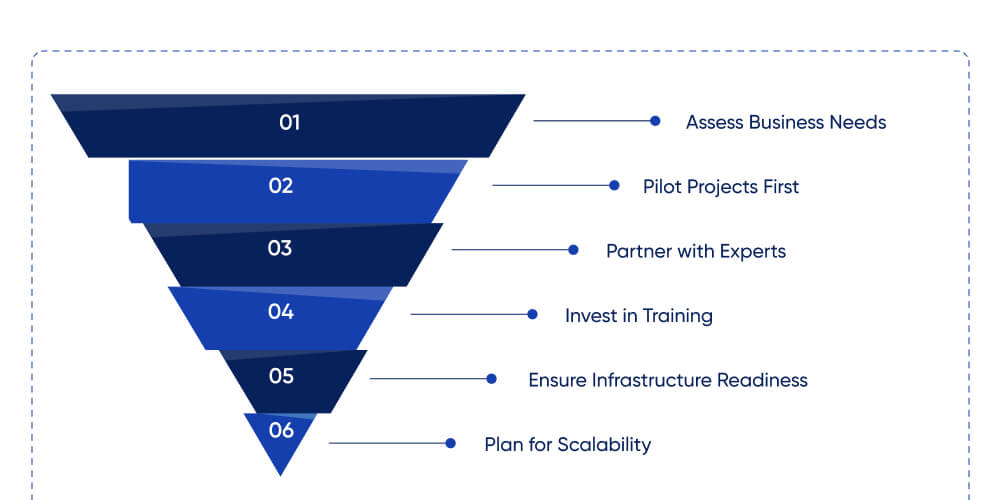
Adopting AI in farming doesn’t have to be overwhelming. By following a structured approach, agriculture companies can smoothly transition into smarter, data-driven operations. Here’s how business owners can begin:
- Assess Business Needs: Identify areas where AI can have the most impact, such as irrigation, crop monitoring, pest control, or supply chain efficiency.
- Pilot Projects First: Instead of overhauling the entire system, launch small-scale AI initiatives. This allows businesses to measure results, adjust strategies, and build confidence before expanding.
- Partner with Experts: By collaborating with an AI software development company, Agribusinesses can receive tailored solutions specifically designed for their specific requirements. These partners bring technical expertise and industry experience to the table.
- Invest in Training: Equipping staff and field workers with the knowledge to use AI tools is critical. Training ensures smooth adoption and better outcomes.
- Ensure Infrastructure Readiness: Reliable connectivity, IoT sensors, and data management systems are essential for running AI in agriculture applications effectively.
- Plan for Scalability: Design your AI strategy to grow with your business. As farms expand or diversify, AI tools should adapt seamlessly.
By taking gradual steps and working with the right technology partners, agriculture businesses can use the full potential of AI farming without unnecessary risks.
Curious About Generative AI in Farming?
Simulate growth scenarios, optimize seed strategies, and innovate faster. Complete the form to explore how generative AI can revolutionize your agricultural operations.
The Future of AI in Agriculture
The future of farming is set to be smarter, more connected, and highly efficient. With ongoing advancements, AI is moving beyond crop monitoring and irrigation into areas like autonomous machinery, predictive market analysis, and even farm-to-fork transparency.
Generative AI applications in agriculture will allow farmers to simulate growth conditions, optimise seed selection, and explore new techniques before applying them in the field. AI-driven chatbots are also beginning to support farmers by answering queries, guiding them on crop health, and offering instant recommendations, making AI Chatbot Development a valuable tool for modern farming enterprises.
For agriculture businesses, this future means integrating more tailored solutions into their operations. Partnering with an experienced AI app development company will ensure access to customized platforms that evolve with market trends and farming needs. These solutions not only boost productivity but also help create a sustainable agricultural ecosystem.
By embracing innovation early, agribusinesses can secure their position in a competitive market while contributing to global food security and environmental sustainability.
How DITS Can Help with AI Applications for Agriculture
At DITS, we understand that every agriculture business has unique challenges; whether it’s optimizing irrigation, improving crop monitoring, or streamlining the supply chain. That’s why we focus on building tailored solutions that make AI adoption practical, efficient, and results-driven.
Our expertise as an AI software development company allows us to design custom platforms that align with your operational goals. From smart irrigation systems powered by IoT sensors to predictive yield forecasting tools, we create solutions that deliver measurable outcomes.
DITS also integrates AI into the entire software development lifecycle. We use AI for software development, quality assurance, maintaining code quality, and customization, ensuring every solution is powerful, scalable, and reliable.
Whether you’re looking to adopt innovative AI applications in agriculture or explore future-ready tools like generative AI, our team ensures seamless integration of AI with your existing systems. The result is technology that empowers businesses to make better decisions, increase efficiency, and achieve higher profitability.
Want to Optimize Your Supply Chain?
AI reduces waste and enhances market readiness. Fill out the form to uncover tailored solutions that streamline distribution and drive agricultural profitability.
Conclusion
Agriculture is at a turning point where traditional practices are no longer enough to meet global food demands. By embracing AI applications in agriculture, businesses can overcome long-standing challenges like climate unpredictability, resource limitations, and crop losses. From precision irrigation to predictive analytics and generative AI, the possibilities are endless.
For agriculture business owners, adopting AI means more than just increasing yields; it ensures sustainability, cost savings, and long-term competitiveness in a fast-changing market. With the right technology partners and tailored solutions, farms can transform into future-ready enterprises that thrive in both productivity and profitability.
Now is the time to act. Businesses that invest in artificial intelligence in agriculture today will lead the way in shaping the farms of tomorrow.
FAQs
1. How does AI improve crop yield in agriculture?
AI improves crop yield by analyzing soil health, weather conditions, and crop growth patterns. It helps farmers detect diseases early, optimize irrigation, and apply resources efficiently, resulting in healthier plants and better harvests.
2. What are some innovative AI applications in agriculture?
Innovative AI tools include smart irrigation systems, AI-powered drones for crop monitoring, predictive yield forecasting, pest detection robots, and even generative AI models that simulate crop growth scenarios. These technologies make farming smarter and more sustainable.
3. Can small farms also benefit from AI farming solutions?
Yes. Small farms can adopt affordable AI farming tools such as mobile apps, IoT sensors, and AI chatbots to monitor crops, track soil conditions, and receive real-time advice. These solutions help small-scale farmers reduce costs and improve efficiency.
4. How cost-effective are AI applications in agriculture for businesses?
AI reduces costs by optimizing water use, minimizing chemical inputs, automating labor-intensive tasks, and preventing crop losses. While the initial investment may vary, the long-term savings and yield improvements make AI a cost-effective solution for agribusinesses.
5. Why should agriculture companies work with an AI app development company?
Partnering with an experienced AI app development company ensures that the solutions are customized to your farm’s needs. From precision tools to advanced decision-making platforms, these companies provide scalable, reliable, and future-ready applications that maximize ROI.

Dinesh Thakur
21+ years of IT software development experience in different domains like Business Automation, Healthcare, Retail, Workflow automation, Transportation and logistics, Compliance, Risk Mitigation, POS, etc. Hands-on experience in dealing with overseas clients and providing them with an apt solution to their business needs.
Recent Posts
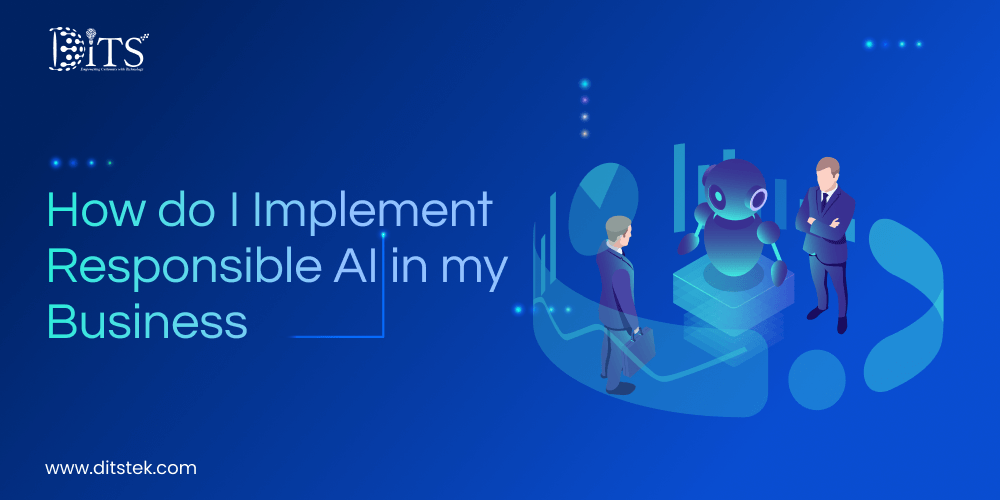
A practical guide explaining how to implement AI in business with responsible governance, secure integration, scalable architecture, and measurable operational impact across industries.
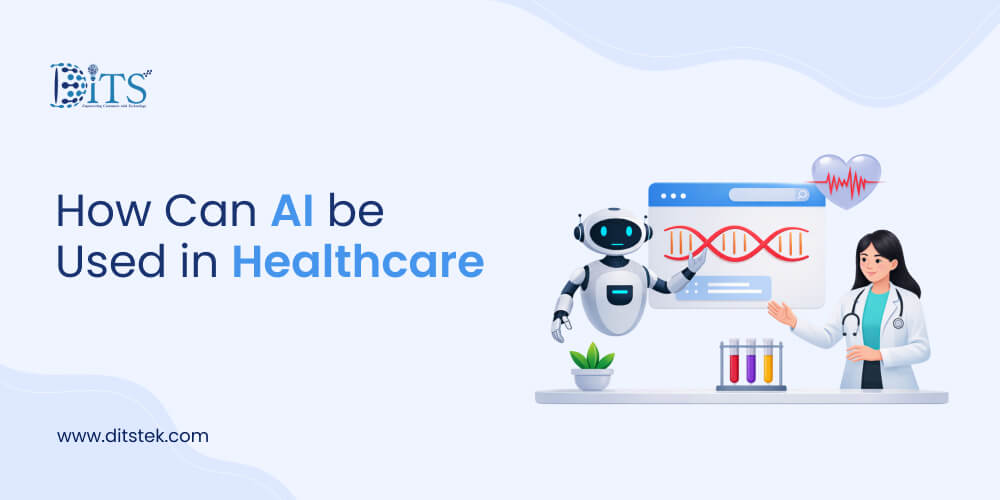
Explore how AI can be used in healthcare to improve diagnostics, automate operations, enhance revenue cycles, and deliver measurable performance outcomes across healthcare organizations.

Building health tech that actually works? Healthcare API integration makes EHR access, FHIR compliance, and real-time syncing possible. Here’s why it’s non-negotiable.